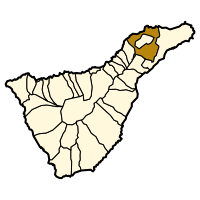San Cristóbal de La Laguna
| San Cristóbal de La Laguna | |
| Map | |
|---|---|

| |
| Statistics | |
| Autonomous region: | Canary Islands |
| Province: | Santa Cruz de Tenerife |
| Island: | Tenerife |
| Area: | 102.06 km² some reads 102.69 km² |
| Population: | 137,314 (2004) |
| Population density: | 1,345.42/km² |
| Elevation: | Atlantic Ocean 546 m 980 m (Pico del Inglés) |
| Length of coastline: | 28.24 km |
| Postal code: | E-38200 |
| Location: | 28.4667/28°28' N lat. 16.31667/16°19' W long. |
| Municipal code: | E-38023 |
| Car designation: | TF
|
| Name of inhabitants: | Laguneros |
| Website: | www.aytolalaguna.com |
| Politics | |
| Mayor: | Ana María Oramas González-Moro (CC) 2nd term |
| UNESCO World Heritage Site | |
|---|---|
 | |
| Criteria | Cultural: ii, iv |
| Reference | 929 |
| Inscription | 1999 (23rd Session) |

San Cristóbal de La Laguna (La Laguna for short, Spanish for "The Lagoon") is a municipality and city of the northern part of the island of Tenerife in the Santa Cruz de Tenerife province, on the Canary Islands. It is in the northern part of the Tenerife island. The city is also a suburban area of the city of Santa Cruz de Tenerife.
It is home to the University of La Laguna which is home to 30,000 students; these are not included in the population figures for the city.
Its economy is business-oriented while agriculture dominates the northeastern portion of the city. The urban area dominates the central and the southern parts. Tourism covers the northern coast. The main industry includes some manufacturing. The industrial area is made up of the main subdivisions of Majuelos, Las Torres de Taco, Las Mantecas and Las Chumberas. In this city one finds the legendary house of Catalina Lercaro's spectrum, also there is in the city the Sister's incorrupt body Maria de Jesus and the Christ of La Laguna (Cristo de La Laguna).
La Laguna was declared World Heritage Site by the UNESCO in 1999.
Coat of arms
The coat of arms was granted by Queen Juana of Castile on 23 march 1510, as arms of the island of Tenerife. The town of La Laguna, being the capital of the island during the first times after the Conquest, adopted this emblem as its own. It features an island with a volcano spitting fire, on waves, between a castle and a lion, and above the Archangel Saint Michael, holding a spear in one hand and a shield in the other. In the border, the inscription Michael Arcangele Veni in Adjutorium Populo Dei Thenerife Me Fecit. These elements symbolize the incorporation of the island of Tenerife to the Crown of Castile and its evangelization under the patronage of Saint Michael.
Subdivisions
- La Verdellada
- Viña Nava
- El Coromoto
- San Benito
- El Bronco
- La Cuesta
- Taco
- Tejina
- Valleguerra
- Bajamar
- Punta del Hidalgo
- Geneto
- Los Baldios
- Guamasa
- El Ortigal
- Las Mercedes
- El Batan
- Las Carboneras
- San Diego
- Las Gavias
History
The city was founded between 1496 and 1497 by Alonso Fernández de Lugo and was the capital of the island after the conclusion of the conquest of the islands. The coastal area was later raided by pirates. The University of La Laguna was founded in 1701.
A declining population and economy in the 18th century resulted in the moving of the capital to Santa Cruz de Tenerife in 1723. Santa Cruz has since been the capital of the island of Tenerife.
The Tenerife North Airport at Los Rodeos was opened in the 1930s and is today expanding with low cost airlines using it.
It was declared a World Heritage Site on December 2, 1999 and several streets of historical significance have been closed off to automobile traffic.
Historical population
| Year | Population | Change |
|---|---|---|
| March 1, 1991 | 110,895 | - |
| May 1, 1996 | 121.769 | - |
| November 1, 2001 | 128,822 | 1,262.96/km² |
| 2002 | 135,004 | - |
| 2003 | 134,004 | - |
| 2004 | 137,314 | 1,337.17/km² |
Folklores
La Laguna is home to some of the best folklore in the Canary Islands, and the most famous folklorists are Los Sabandeños. La Laguna has created 59 folklore groups in and around La Laguna.
People
- José de Anchieta (March 19, 1534–June 9, 1597), important in the early colonial history of Brazil
- Juan Núñez de la Peña (1641–1721), a Spanish historian
- Juan Domingo de Monteverde (1773–1832), military man
- Oscar Domínguez (January 9, 1906 - December 31, 1957 in Paris, a Spanish painter and a surrealist, an inventor of decalcomania
Places
-
Real Santuario del Santísimo Cristo de la Laguna
-
Real Santuario del Santísimo Cristo de la Laguna, inside
-
Convento de Santa Clara des Asis
-
Convento de Sta. Catalina de Siena
-
Casa Alvarado Bracamonte
-
Casa Alvarado Bracamonte, Patio
-
Casa de Montañés, Patio
-
Instituto de Canarias Cabrera Pinto
-
Iglesia de La Conception
-
Iglesia de La Conception
-
San Cristóbal de La Laguna in 1880
External links
- http://www.aytolalaguna.com
- Organismo Autónomo de Deportes de La Laguna, featuring informationa about activities, installations, news, etc. (in Spanish)
- Map of San Cristóbal de la Laguna
- Map and aerial photos
- Street map: Street map from Mapquest, MapPoint or Google
- Satellite images: Google
- Coordinates: 28°29′0″N 16°18′0″W / 28.48333°N 16.30000°W
See also
| North: Atlantic Ocean | ||
| West: Atlantic Ocean | San Cristóbal de La Laguna | East: Santa Cruz de Tenerife |
| Southwest: Tacoronte | South: El Rosario | |
| The municipality surrounds Tegueste | ||












